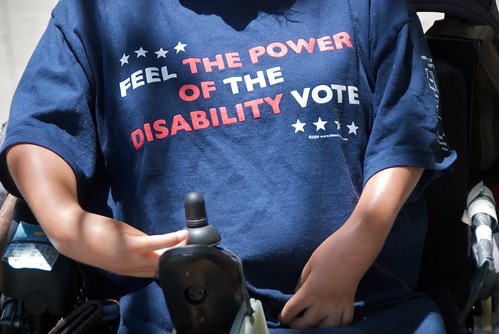I read this letter to Dear Abby and Abby’s awesomely ableist response. I wonder how she would have responded to a different letter. One that was more like this:
Dear Abby,
I was really looking forward to the opportunity to go out with my friend the other night and enjoy a good movie. I don’t get to go out to many of the popular films when they’re playing and everyone is buzzing about them, because very few theatres have descriptive audio available in them, and even when they do, not all films come packaged with such things. I should probably mention that I’m blind.
For example, if I go through the Regal Entertainment Group’s website, I see they have 605 screenings of movies with Descriptive Audio. This may seem like a lot, but counting up all their movie theaters across the US and guessing an average of 10 screens per theater, they have 4400 screens! That’s about 14% of all their showings! And I know from experience that dealing with staff at these theaters can be difficult: When I called a theater in my neighbourhood about descriptive audio, they told me where I could go to see movies that are captioned, which is not exactly helpful.
Anyway, my friend gracious agreed to not only go to a movie with me, but take the time and effort to let me know what was going on on the screen, so I could enjoy the movie too – at least, if the theater we went to didn’t have a descriptive audio option. Blind people are well aware of the various options they have to enjoy movies and other visual art – they certainly don’t need sighted people scolding them over such things!
So, you can imagine my dismay that, at this opportunity to enjoy a movie together, and be able to enjoy a movie while everyone else was talking about it, people were rudely “shushing” my friend, telling her to shut up. I know that it can be difficult and frustrating to have noise when you’re enjoying a movie, but I wonder why these people couldn’t find a less rude way of asking my friend to keep her voice down, or even just move a bit further away so that we, too, could enjoy the movie.
I know you’ll understand my frustration, Abby. I hope that you’ll remind sighted people that blind people have social lives and like to go out and enjoy things just as much as they do. I believe in my heart you’d never tell a blind person to just stay home and watch DVDs rather than risk bothering the sighted public.
Yours,
A Blind Person Who Wishes the ADA Meant Actual Accessible Content For All
P.S. Abby, surely you have statistics on the number of DVDs that are packaged with descriptive audio, right? According to Wikipedia, such DVDs are pretty rare. I bet you already know that the number of DVDs released with descriptive audio in the US in 2009 was 11.
![Movie poster from Dreamworks' How To Train Your Dragon: a night-blue sky with a full moon, and a midnight black dragon with large, pale eyes stares down at a pale, brown haired boy who reaches up to try to touch its face. The poster text reads: Dreamworks [next line] How to Train Your [next line] Dragon [next line] 3D. Movie poster from Dreamworks' How To Train Your Dragon: a night-blue sky with a full moon, and a midnight black dragon with large, pale eyes stares down at a pale, brown haired boy who reaches up to try to touch its face. The poster text reads: Dreamworks [next line] How to Train Your [next line] Dragon [next line] 3D.](http://disabledfeminists.com/fwd/wp-content/uploads/2010/07/how_to_train_your_dragon_9118.jpg)



